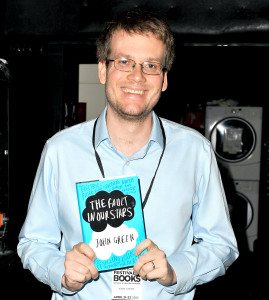Maybe John Green will be our always
[dropcap]T[/dropcap]he Fault in Our Stars, this beautiful, wonderful, gut-wrenching, thought-provoking novel, is about many things. It is a novel about dying, it is a novel about literary genius, about hero-worship, hamartias, love, friendship, the human condition. Primarily, it is a novel about two slightly pretentious teenagers who appreciate the metaphorical resonances of an unlit cigarette between your lips (“you put the killing thing right between your teeth, but you don’t give it the power to do its killing”) and the correct use of the term literally.
There is nevertheless something about John Green’s writing style which prevents you from viewing Hazel Grace Lancaster, narrator and protagonist, and Augustus Waters, the great love of her life, as anything other than two perfect characters in a desperately tragic modern love story.
“I fear oblivion,” he said without a moment’s pause…
Just this once, I decided to speak… ” There will come a time when all of us are dead…There will come a time when there are no human beings remaining to remember that anyone ever existed or that our species ever did anything. There will be no one left to remember Aristotle or Cleopatra, let alone you. Everything that we did and built and wrote and thought and discovered will be forgotten and all of this” – I gestured encompassingly – “will have been for naught…There was a time before organisms experienced consciousness, and there will be a time after. And if the inevitability of human oblivion worries you, I encourage you to ignore it. God knows that’s what everyone else does.”
This novel is deeply poetic. Every few lines Hazel accurately summarises a thought you have been unable to put into words for your whole life. Somehow it makes you feel as though you are the one suffering from an incurable disease; you are the one who wakes up daily and has to face the inevitable notion of death and what will happen to your parents when you are ultimately one of its victims.
[pullquote style=”right” quote=”dark”]A book is a script, and a film is merely one interpretation of this script[/pullquote] From the trailers of The Fault in Our Stars, the cinematic interpretation of this book looks promising, in that the actors aren’t too perfect or too old or too “Hollywood” to relate to. But I feel that some people have come to see watching a film as an alternative to reading the original book, and that is not the case. A film is an aspect of the book – the dialogue and the visual, but not the thoughts, the internal monologue, the stuff you can really sink your teeth into.
Every time someone else reads the book, they form a different picture of Hazel, Augustus, Indiana, Amsterdam, white asparagus, Peter van Houten: this is the beauty of a good novel. If you watch a film first and then read the book, everything has been provided for you. The purpose of your imagination in the reading of a book has been taken away. The crushing agony and desperation of Hazel’s thoughts cannot be conveyed through a screen; through actions or dialogue. You need to read it, to share it with Hazel as narrator, to truly understand it.
 John Green has an amazing mind and his greatness is conveyed in this novel through words, not through a screen. As John Green writes himself from the perspective of Hazel’s mum, television is a passivity, not an activity. So it seems that watching The Fault in Our Stars without reading the book is the ultimate insult to the magnificent author who gave us the material for the film in the first place.
John Green has an amazing mind and his greatness is conveyed in this novel through words, not through a screen. As John Green writes himself from the perspective of Hazel’s mum, television is a passivity, not an activity. So it seems that watching The Fault in Our Stars without reading the book is the ultimate insult to the magnificent author who gave us the material for the film in the first place.
There is a final part of the book I want to share to convince you that reading it is absolutely vital to getting everything you can out of it. Hazel, attempting to describe her grief in internal monologue, says:
‘Here it was, the great and terrible ten, slamming me again and again as I lay still and alone in my bed staring at the ceiling, the waves tossing me against the rocks then pulling me back out to sea so they could launch me again into the jagged face of the cliff, leaving me floating face up on the water, undrowned.’
This passage, coming in the middle of an agonising set of pages that keeps you blubbering uncontrollably, is so powerful that no pictures on a screen can hold the same power.
The author behind the novel
John Green himself is quite the opposite of the fictional writer included in the novel, Peter van Houten, the reclusive, alcohol-addled author of An Imperial Affliction. Houten has social issues and a terrible temper, and all but defecates on the dreams of his young fans. Green is all over the internet: from his Crash Course videos to his Vlogbrothers channel, he just seems so friendly, like if you met him in the street he would shake your hand and have a chat with you and be so utterly chuffed that you’d read his book.
 Green has various projects running on YouTube, including the Vlogbrothers channel, a series of videos between himself and his brother, Hank, about things from Twilight to how to name your baby.
Green has various projects running on YouTube, including the Vlogbrothers channel, a series of videos between himself and his brother, Hank, about things from Twilight to how to name your baby.
Here he rants about the cost of Health Care in the US.
One of the Vlogbrother’s babies is Project for Awesome. This involves people putting up videos on YouTube about charities they think are really important, and encourages people to donate to Project for Awesome, which distributes money between chosen charities.
Finally, John Green hosts Crash Course videos which are essentially beginner guides to topics in Literature, History, Psychology, Ecology, Biology, Chemistry, etc. While the videos on, say, Sylvia Plath or Imperialism, could not be used as a secondary source in an essay for uni, they open up topics that may be considered by some as ‘boring’, and provide a broad knowledge on various subjects. It’s a great way to become educated in an entertaining way.

Comments